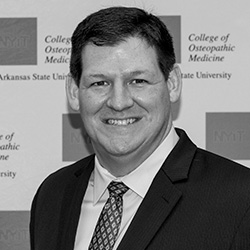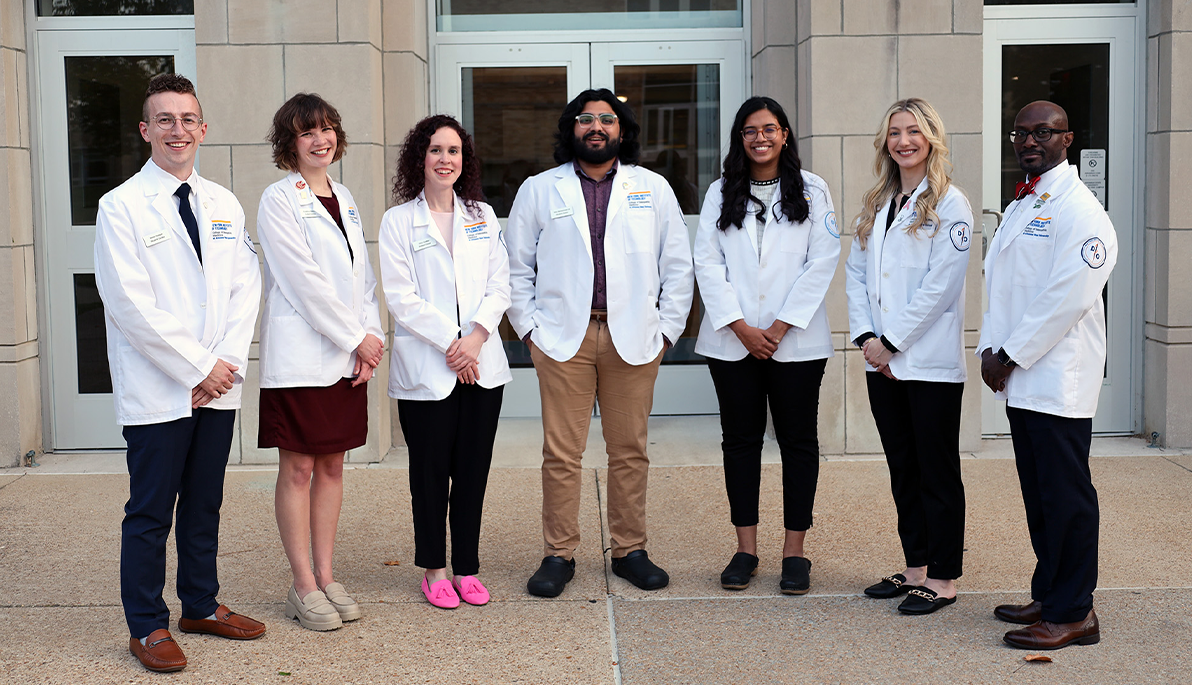News
NYITCOM-Arkansas Students Named to Delta Health Policy Fellowship Program
November 21, 2023
Pictured from left: NYITCOM-Arkansas Student Doctors Kevin Hodson, Angelica Maiers, Gina Qualter, Taha Muhammad-Ali, Jana Dsouza, Avery Carter, and Antonio Patterson were recently named to the medical school’s Delta Health Policy Fellowship program.
Seven medical students at the College of Osteopathic Medicine at Arkansas State University (NYITCOM-Arkansas) have been named to the medical school’s Delta Health Policy Fellowship program.
Student Doctors Avery Carter, Jana Dsouza, Kevin Hodson, Angelica Maiers, Antonio Patterson, Taha Muhammad-Ali, and Gina Qualter, all of whom are in their second year, will participate in a robust practicum experience with local, state, and federal leaders that will allow them to contribute to decision-making that will affect the health of communities in Arkansas and across the Delta.
NYITCOM’s Population Health Fellowship operates through the Delta Population Health Institute (DPHI), which serves as the Jonesboro-based medical school’s community engagement arm.
“The goal of the fellowship is to equip and train rising osteopathic physicians to transform health, healthcare, and health policy,” said Brookshield Laurent, D.O., chair of clinical medicine at NYITCOM-Arkansas and the executive director of the DPHI. “This fellowship program helps osteopathic medical students learn and utilize their skills in health policy to enhance the osteopathic medical profession and become community health leaders. We’re extremely proud that these student doctors are committed to making a difference through health policy.”
Locally, population health fellows work with Congressman Rick Crawford’s office where they meet monthly with his staff, and work to identify an area of research, obtain data, and perform on-site visits to help evaluate the different funding streams provided by federal agencies that grant funding to the Mississippi Delta region. Some fellows spend time in Crawford’s Washington, D.C., office during their fourth year of medical school as well.
“Every year, our health fellows are critical assets to our team as we work on evaluating health policy and funding to ensure the needs of the Delta are being met,” Crawford said. “These student doctors also walk away with a better understanding of federal health programs and how to improve health outcomes of rural Americans. I’m excited to once again welcome participants in this innovative fellowship program into our Arkansas and Washington offices.”
Throughout their three-year fellowship, the students will be actively engaging leaders throughout the state and region to create tangible results to improve health and wellness in the Delta. Currently, the fellows are focused on improving access to nutritious food, creating better opportunities for those with mental illness, and improving the health of moms and their babies.
Upon completion of the fellowship, the student physicians will bring a depth of expertise and knowledge about population health and healthcare to the policymaking process while serving as a health policy liaison.
“So much of medical education curriculum understandably focuses on clinical aspects, but health starts where we grow, live, learn, work, and play,” Laurent said. “That's why we are committed to cultivating opportunities for health in our families, neighborhoods, schools, and jobs to achieve greater health equity among all people. Health policy plays such a vital role in that, which is why the fellowship program is so important.”

By Casey Pearce




